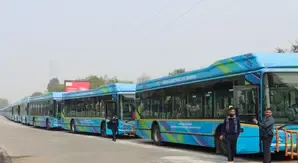Sales of Electric Buses in India Projected to Increase by 15% to 17,000 Units by FY27: Report

Synopsis
Key Takeaways
- Projected sales of electric buses to exceed 17,000 units by FY27.
- Electric buses accounted for 4% of annual registrations in FY24.
- Significant growth in the e-bus market with 81% year-on-year increase.
- Government policies are expected to support e-bus adoption.
- India's e-bus market shows strong manufacturing capabilities.
New Delhi, March 11 (NationPress) The annual sales volume of electric buses in India is anticipated to surpass 17,000 units in FY27, marking an impressive growth of approximately 15 percent from the total bus sales growth of 4 percent in FY24, according to a report released on Tuesday.
Electric buses represent 4 percent of the total annual bus registrations in the country, with 3,644 units sold in FY24, indicating a remarkable year-on-year growth of 81 percent.
The shift towards cleaner fuel alternatives has led to a decline in the market share of traditional diesel and petrol buses, dropping from 97-98 percent a decade ago to 90 percent in FY24, as reported by CareEdge Ratings.
“Up to now, the penetration of e-buses has been largely confined to a few major cities, but there is a gradual rollout of e-buses in more locations, which is expected to foster widespread acceptance across the nation,” stated Arti Roy, Associate Director at CareEdge Ratings.
Government backing has been evident through various policy measures, which are projected to persist in the foreseeable future.
India’s potential for electric buses is considerable, with only six e-buses per million inhabitants compared to the global average of 85.
Currently, the adoption of e-buses is limited to specific states and cities; however, broader adoption is expected to propel exceptional sales growth in the medium term.
The report highlights that India has a robust e-bus manufacturing capacity, with five companies holding over 85 percent of the market share and a combined manufacturing capacity of 40,500 e-buses annually.
Additionally, these companies possess a substantial order backlog due to recent auctions conducted by various State Transport Undertakings (STUs).
The evolution of the Gross Cost Contract (GCC) model, as opposed to the outright purchase of buses by STUs, is expected to significantly accelerate e-bus adoption; although, some concerns remain regarding the financial health of many STUs, despite the presence of a payment security mechanism.
Moreover, the total cost of ownership (TCO) for an AC e-bus is approximately 15-20 percent lower than that of AC diesel buses over a period of 12 years, making it a compelling long-term investment.
The strong governmental push through initiatives like PM e-Bus Seva and PM e-Drive indicates that the annual sales volume of e-buses in India is poised for further growth, as highlighted by the report.









